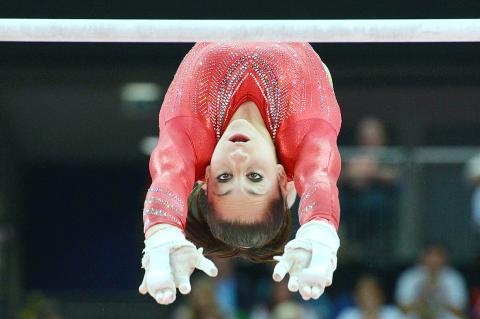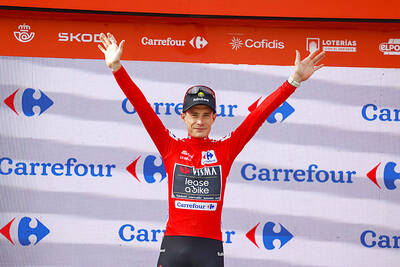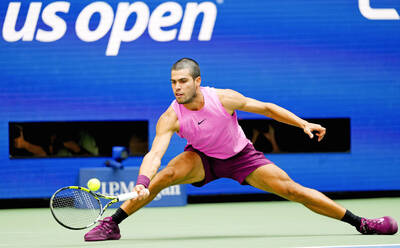The US won the women’s team gymnastics final on Tuesday to claim their first gold medal in the event since the “Magnificent Seven” triumphed at the 1996 Atlanta Games.
Russia, runners-up to the US at last year’s world championships, finished second, with Romania pipping 2008 Olympic champions China to the bronze medal.
The US had dominated in qualifying on Sunday, but unlike their male counterparts, who finished a disappointing fifth in Monday’s men’s final, they reproduced the same high performance level when it mattered.

Photo: AFP
“We didn’t really pay too much attention to the score,” said US team member Jordyn Wieber, the reigning world champion. “We just knew we had a really important job to do and that we just had to do what we’d been practicing. After the floor, we were just really happy that we’d performed so well.”
Victory was particularly sweet for Wieber, who lost out on a place in the individual all-around final to teammate Alexandra Raisman, but played a key role in Tuesday’s triumph.
The US’ winning score of 183.596 points was even more handsome than their qualifying tally and gave them a comfortable advantage of 5.066 points over Russia, some of whom were reduced to tears.
“At the beginning they were tears of disappointment, but the second tears were tears of joy [at winning the silver medal],” explained Russia’s Aliya Mustafina, the 2010 world champion.
Britain were unable to repeat the success the bronze medal-winning men’s team enjoyed on Monday and they finished in sixth place, behind Canada, with Italy seventh and Japan eighth.
The US team had set the tone in both podium training and qualifying with assured performances on the vault, and once again they asserted their authority with three superb Amanar vaults in the first rotation.
Two days on from her individual qualifying heartache, Wieber led the way with a vault that earned her a score of 15.933, before Gabrielle Douglas (15.966) and McKayla Maroney (16.233) followed suit to give the US an ideal start.
Russia could not compete on the vault, with Maria Paseka almost stumbling off the mat with her attempted Amanar, and the US led China by 1.733 points after the first rotation, with Russia third.
However, Russia impressed on the bars — Viktoria Komova top-scoring with 15.766 — and the US’ lead had been eroded to 0.399 points by the halfway stage.
The US kept the pressure on with three solid beam routines, and Mustafina and Komova both committed errors during their displays to hand the US the initiative.
Further woe arrived on the floor for Russia when Anastasia Grishina failed to complete her second tumbling pass, before Kseniia Afanaseva fell badly on her knees.
It put the US in a commanding position, and after Douglas and Wieber produced confident and fault-free floor routines, Raisman secured the gold with yet another nerveless display.
The win is only the second ever scored by the US women in the team event following the famous victory of the 1996.
Romania’s bronze medal confirmed their recent strong form after their triumph at the European championships in Brussels in May, and it saw them finish on the podium at the Olympics for the 10th Games in succession.
“Every morning when I wake up, I ask myself how we’re supposed to compete with the USA, China and Russia, looking at their potential,” Romania coach Octavian Bellu said. “Our last result in Beijing was also a third place. For me, it’s like a feeling of survival.”

Jonas Vingegaard on Tuesday claimed the overall Vuelta a Espana lead while Jay Vine earned the stage 10 victory for his second triumph of the race. Two-time Tour de France winner Vingegaard overhauled Torstein Traen’s lead to head the general classification by 26 seconds from the Norwegian, with Joao Almeida third and trailing the Dane by 38 seconds. Vine put in an unmatchable performance on the final climb to finish ahead of Spanish Movistar riders Pablo Castrillo and Javier Romo. “Back in red, I’m happy with it, it’s a beautiful jersey,” Vingegaard said. “I’m happy with how the day went,

Australian Alex de Minaur reached the second week of the US Open for the third year in a row with little fanfare on Saturday and said he intended to keep winning until the tournament organizers were forced to give him better billing. Despite being the eighth seed and a quarter-finalist last year at Flushing Meadows, De Minaur’s third-round match against German Daniel Altmaier was scheduled for Court 17 — the smallest of the four stadium venues in the precinct. “It is a little bit of a headscratcher for me. I’m not gonna lie,” he told reporters after progressing 6-7 (9/7), 6-3, 6-4,

RIVALRY: Carlos Alcaraz lost his previous two matches against Serbia’s Novak Djokovic, in the Australian Open quarter-finals this year and Paris Olympics final last year Spain’s Carlos Alcaraz on Tuesday dazzled at the US Open to make the semi-finals before Novak Djokovic of Serbia danced his way through to book a New York showdown with the Spaniard that would mark the latest chapter in their generational rivalry. Former champion Alcaraz produced yet another entertaining display at Flushing Meadows to dismantle 20th seed Jiri Lehecka 6-4, 6-2, 6-4 at a sunbathed Arthur Ashe Stadium, securing his place in the last four without dropping a set this year. “Sometimes I play a shot that I should not play in that moment, but it’s the way I love

Spain are in danger of not getting out of EuroBasket Group C after losing 67-63 to Italy on Tuesday, but the defending champions still control their destiny. Marco Spissu put Italy in front for good at 64-63 with two free throws with 31 seconds left and made two more with 14 seconds remaining. Giampaolo Ricci converted one of two free throws with eight seconds on the clock. Spain, which in 2022 won their fourth title, are tied with Georgia, and Bosnia and Herzegovina at 2-2 each. Greece and Italy have clinched two of the group’s four spots in the round-of-16,